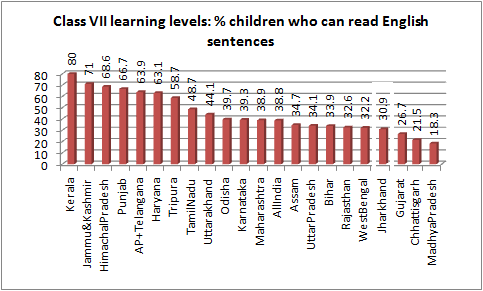Gujarat fails to promote English five years after it launched programme to teach the language via satellite
By Rajiv Shah
Latest data collected by the Annual Status of Education
Report (ASER), prepared by elite NGO Pratham, has suggested that Gujarat’s
five-year efforts to push English among schools has miserably failed. Released
on January 13, 2015, the top study has found that just about 9.8 per cent of
the children in rural Gujarat, studying in class V, could read English
sentences, which is the lowest scorecard compared to the rural areas of all other major Indian states, but Madhya Pradesh (9.6
per cent). The all-India average on this score is 24 per cent, and Kerala
tops with a whopping 68.5 per cent.
The survey further finds that, of those who could read
English sentences, just about 54.8 per cent of rural Gujarat’s class V
children, and 69.8 per cent class VII children, could tell the meaning of what they
were reading. This is against 62.2 per cent of children of class V and 66.3 per
cent children of class VII children telling meaning of English sentences out of
those who could read them at the all-India level.
Poor report card of English in Gujarat comes despite the state government's what seemed in 2009 to be valiant efforts to promote English, "setting aside" the RSS’ ideological
reservations towards encouraging the language. The Modi government in 2009 declared it was all
set to spread teaching of English in Gujarat's schools with the help of the
Educational Satellite of the Indian Space Research Organisation (ISRO).
At that time, it was declared that more than 20 million
children studying in 22,000 government schools of Gujarat would “benefit” from
the programme to learn English. The programme had found opposition from Vidya
Bharti, the education wing of the RSS, which was opposed to the propagation of
English over Gujarati. Modi had then insisted that English had to be “conquered” first if Gujarat had to emerge as
a global player.
In fact, the Gujarat government in 2009 launched a Rs
600-crore project to provide a 42-inch LCD or plasma screen TV sets to directly
telecast English lessons to be given by teachers from Bhaskaracharya Institute
for Space Application and Geo-informatics (BISAG) in Gandhiangar.
At that time, already, some 5,000 schools had wide-screen TV sets. Rest of the
schools would have to be provided the sets in due course.
Modi’s website, www.narendramodi.in, pointing towards the
importance of English, said three years later, in 2012, that to “increase” the
knowledge of the English language among Gujarati youth, the state government had
started SCOPE (The Society for Creation of Opportunity through Proficiency in
English) programmes. “Over two lakh students have acquired proficiency in
English so far through this initiative”, it declared, adding English speaking
was a “requirement of a Gujarati student”.



Comments